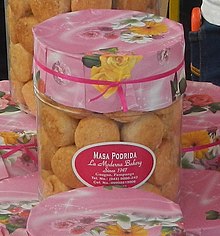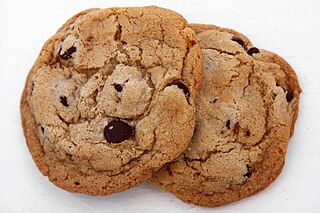
A cookie, or a biscuit, is a baked or cooked snack or dessert that is typically small, flat and sweet. It usually contains flour, sugar, egg, and some type of oil, fat, or butter. It may include other ingredients such as raisins, oats, chocolate chips, nuts, etc.

Pampanga, officially the Province of Pampanga, is a province in the Central Luzon region of the Philippines. Lying on the northern shore of Manila Bay, Pampanga is bordered by Tarlac to the north, Nueva Ecija to the northeast, Bulacan to the east, Manila Bay to the central-south, Bataan to the southwest and Zambales to the west. Its capital is the City of San Fernando. Angeles City is the largest LGU, but while geographically within Pampanga, it is classified as a first-class, highly urbanized city and has been governed independently of the province since it received its charter in 1964.

An empanada is a type of baked or fried turnover consisting of pastry and filling, common in Spanish, other Southern European, Latin American, and Iberian-influenced cultures around the world. The name comes from the Spanish empanar, and translates as 'breaded', that is, wrapped or coated in bread. They are made by folding dough over a filling, which may consist of meat, cheese, tomato, corn, or other ingredients, and then cooking the resulting turnover, either by baking or frying.

The Keebler Company is an American cookie and former cracker manufacturer. Founded in 1853, it has produced numerous baked snacks, advertised with the Keebler Elves. Keebler had marketed its brands such as Cheez-It, Chips Deluxe, Club Crackers, E.L. Fudge Cookies, Famous Amos, Fudge Shoppe Cookies, Murray cookies, Austin, Plantation, Vienna Fingers, Town House Crackers, Wheatables, Sandie's Shortbread, Pizzarias Pizza Chips, Chachos and Zesta Crackers, among others. Keebler slogans have included "Uncommonly Good" and "a little elfin magic goes a long way". Tom Shutter and Leo Burnett wrote the familiar jingle.

A hamantash is an Ashkenazi Jewish triangular filled-pocket pastry associated with the Jewish holiday of Purim. The name refers to Haman, the villain in the Purim story. In Hebrew, hamantashen are also known as אוזני המן, meaning "Haman's ears". "Haman's ears" also refers to a Sephardic Purim pastry, "Orejas de Haman", thought to originate in Spain and Italy, that is made by frying twisted or rolled strips of dough.

A sugar cookie, or sugar biscuit, is a cookie with the main ingredients being sugar, flour, butter, eggs, vanilla, and either baking powder or baking soda. Sugar cookies may be formed by hand, dropped, or rolled and cut into shapes. They may be decorated with additional sugar, icing, sprinkles, or a combination of these. Decorative shapes and figures can be cut into the rolled-out dough using a cookie cutter.

A gordita in Mexican cuisine is a dish made with masa and stuffed with cheese, meat, or other fillings. It is similar to the Colombian and Venezuelan arepa. Gordita means "chubby" in Spanish. There are two main variations of this dish, one of which is typically fried in a deep wok-shaped comal, consumed mostly in central and southern Mexico, and another one baked on a regular comal. The most common and representative variation of this dish is the "gordita de chicharrón", filled with chicharron which is widely consumed throughout Mexico. Gorditas are often eaten as a lunch dish and accompanied by several types of sauce.

The Gingerdead Man is a 2005 American comedy slasher film directed by Charles Band. Gary Busey stars as the titular Gingerdead Man, created from a mix of gingerbread spice mix and the ashes of deceased serial killer Millard Findlemeyer, who terrorizes a small-town bakery. The film also stars Robin Sydney, Jonathan Chase, Alexia Aleman, Margaret Blye, James Snyder, and Larry Cedar.
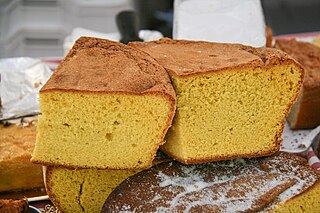
Bizcocho is the name given in the Spanish-speaking world to a wide range of pastries, cakes or cookies. The exact product to which the word bizcocho is applied varies widely depending on the region and country. For instance, in Spain bizcocho is exclusively used to refer to sponge cake. In Uruguay, most buttery flaky pastry including croissants are termed bizcocho, whilst sponge cake is called bizcochuelo. In Chile, the Dominican Republic and Bolivia bizcocho refers to a sweet dough (masa) baked with local ingredients, similar to the bizcocho from Spain. In Ecuador the dough of a bizcocho can either be sweet or salty. The US state New Mexico is unusual in using the diminutive form of the name, bizcochito, as the name for a locally developed and very popular cookie.
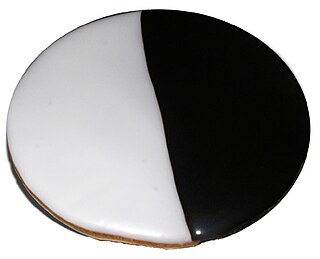
Black-and-white cookies, half-and-half cookies, and half-moon cookies are similar round cookies iced or frosted in two colors, with one half vanilla and the other chocolate. They are found in the Northeastern United States and Florida. Black-and-white cookies are flat, have fondant or sometimes royal icing on a dense cake base, and are common in the New York metropolitan area. Half-moon cookies are slightly dome-shaped (convex), have frosting on a fluffy angel cake base, and are common in Central New York and Boston, Massachusetts.

Puto is a Filipino steamed rice cake, traditionally made from slightly fermented rice dough (galapong). It is eaten as is or as an accompaniment to a number of savoury dishes. Puto is also an umbrella term for various kinds of indigenous steamed cakes, including those made without rice. It is a sub-type of kakanin.

A half-moon cookie in Filipino cuisine is a semicircle- or crescent-shaped butter cookie. It has a soft crumbly texture and a sweet flavor with a salty aftertaste.

Mamón are traditional Filipino chiffon or sponge cakes, typically baked in distinctive cupcake-like molds. In the Visayas regions, mamón are also known as torta mamón or torta. Variants of mamón include the larger loaf-like version called taisan, the rolled version called pianono, and ladyfingers known as broas. Mamón also has two very different variants that use mostly the same ingredients, the cookie-like mamón tostado and the steamed puto mamón.
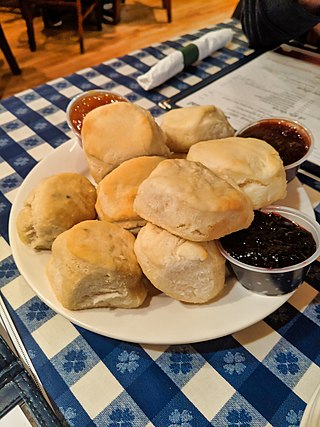
In the United States and Canada, a biscuit is a variety of baked bread with a firm, dry exterior and a soft, crumbly interior. It is made with baking powder as a leavening agent rather than yeast, and at times is called a baking powder biscuit to differentiate it from other types. Like other forms of bread, a biscuit is often served with butter or other condiments, flavored with other ingredients, or combined with other types of food to make sandwiches or other dishes.

Puto seco, also known as puto masa, are Filipino cookies made from ground glutinous rice, cornstarch, sugar, salt, butter, and eggs. They are characteristically white and often shaped into thick disks. They have a dry, powdery texture.

Insomnia Cookies is a chain of bakeries in the United States that specializes in delivering warm cookies, baked goods, and ice cream. Based in New York and Philadelphia, it was started in 2003 by Jared Barnett and Seth Berkowitz, both students at the University of Pennsylvania. The company has more than 240 stores, located throughout the continental U.S. Many stores are located in close proximity to university campuses and cater to students who want to order cookies late at night.

In Philippine cuisine, roscas or biscocho de roscas refers to a pastry cookie product from the province of Leyte, mainly from the towns of Barugo and Carigara, made from lard, anise, flour, sugar, butter and eggs. Roscas are initially shaped as crescents or penannular rings. Each of the roscas is then cut in half before baking, resulting in two separate elbow-shaped cookies.
Biscochos, also known as biscochos de huevo, or biscotios, are a traditional Sephardi Jewish ring-shaped cookie commonly prepared for Hanukkah, Purim, and other Jewish holidays.

Hello Robin is a woman-owned bakery with two locations in Seattle, in the U.S. state of Washington. The original bakery opened on Capitol Hill in 2013. A second location opened at University Village in 2020.
